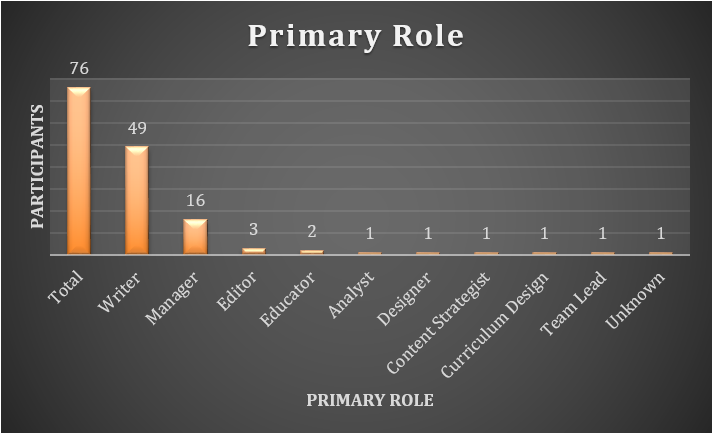By Dr. Breeanne Matheson and Dr. Emily January Petersen
After interviewing 49 female technical writers in Chennai, Pune, and Hyderabad in July 2016, we wanted to know more. We
Roles and Experiences
A total of 76 people participated in the survey. Writing, according to the results (see Images 1 and 6), is the most important skill. Most participants identified their primary role as “writer,” with the next most common response as “manager” (see Image 1).

The majority had a significant amount of experience, with 33 people having between six and ten years. Twenty-five more reported between 11 and 20 years; only three participants had less than a year experience.

Education and Training
Respondents mostly held bachelor’s degrees in engineering, followed by degrees in science, with literature degrees far behind. Some 31 participants reported graduate degrees, commonly in engineering or science (see Image 3). Nine participants completed a certification course in technical communication, likely through private institutions.


According to the results (see Image 5), workers entering technical communication should have “experience working in a technical field.” This response was chosen nearly twice as often as the other options. Also important is a “certificate or degree in technical communication.” Participants explained that certificates were their most valuable educational experience. Selected third most often was “mentoring from other professionals,” and fourth was “a degree in any field.” Seven participants mentioned that they valued on-the-job training, and six participants said having a technical degree was their most helpful credential. One explained, “pursuing engineering is my biggest advantage, at least I would love to believe so. It’s helped me in understanding the products I write about and adapt to different technologies easily.” Several participants also pointed to various technology

Conferences were cited as a valuable opportunity. Participants named city-specific learning sessions and STC conferences as useful. Other practical training opportunities included courses on language/writing, information architecture, project management, leadership skills, editing, film-making, and communication.
More training and professional development
Important Skills
Participants were asked to select (from a list) five skills they thought to be most important in technical communication. Writing was by far the most common choice, suggesting that despite technical backgrounds, a strong command of language remains vital. Research skills and technical skills/knowledge were close behind. Also important were user experience and information architecture, selected at similar rates as other traditional writing skills, such as editing and organizing information (see Image 6). This suggests that skills for working in technical platforms have become an integral part of technical communication.

Future Trends
To understand emerging trends, we asked participants about how the field might change over the next decade. Overall, participants suggested that being nimble and flexible are vital parts of facing the future. This was captured by the participant who observed that technical writers should become “‘Super Writers’ who can unlearn and relearn to meet the competitive world.” Based on ideas from questionnaire results, a “Super Writer” might be somebody who can adapt to changing circumstances, learn new technologies and processes quickly, and shift skills to stay relevant.
Fourteen respondents imagined that practitioners will still be involved in developing content, writing, and communicating; however, they might do so using different tools. Participants used words like “interactive,” “dynamic,” “animated,” “personalized,” and “intelligent” to describe how they anticipated content transforming. Further, participants said content might be “more interactive,” targeted to individual users, and presented in formats more appropriate for mobile and video.
Participants observed that practitioners could start taking responsibility for improved user experience to reflect innovative content delivery methods mentioned above. Some expected that they might be “engaging closely with user experience professionals,” while others suggested they might be “merged with” or “double[d] up” as user experience professionals.
In terms of innovations, participants observed that automated technologies, such as chatbots, artificial intelligence, and machine learning, were the future. Innovations in areas such as analytics, content management systems, cloud-based content, “tool tips,” conversational authoring, self publishing, digitization, intuitive technologies, performance-driven help, and other integrations were predicted.
Remaining relevant to organizations is also a concern. Eight respondents said practitioners will need to contribute more to broad organizational functions. They suggested getting involved in “product and innovation” as part of development processes, aligning content with other teams’ functions, helping teams with research, and integrating with product, sales, or support teams.
Global Workplaces
Participants have taught worldwide practitioners many skills, including writing in
Participants reported learning collaboration, technologies and software, writing techniques, and trends in technical communication from overseas colleagues. (See Image 7.) Given these responses, the global collaboration of practitioners is a networked relationship in which both sides are benefitting.

Conclusion
The practitioners surveyed represent a technically savvy workforce of Super Writers, experts at functioning in globalized environments. They are actively engaged in obtaining and practicing diverse skills to preserve market demand. Although practitioners lack access to technical communication-specific training at universities, they leverage high levels of education to strengthen professional legitimacy.
Acknowledgments
This project was made possible by funding from the Utah State University Research and Graduate Studies Dissertation Enhancement Award.
About the Authors

Dr. Breeanne Matheson is an assistant professor in the English and Literature department at Utah Valley University. Her work focuses on global and community-based research in order to understand the many ways technical communication works to make a change in the world. In addition to her research, she teaches classes in technical communication, writing for social change, and community-based learning.

Dr. Emily January Petersen is an assistant professor of technical communication at Weber State University. Her research focuses on the professional identities of female technical communicators globally, professionally, historically, and extra-institutionally. Her academic work has been published in several journals and edited collections.

Recent Comments